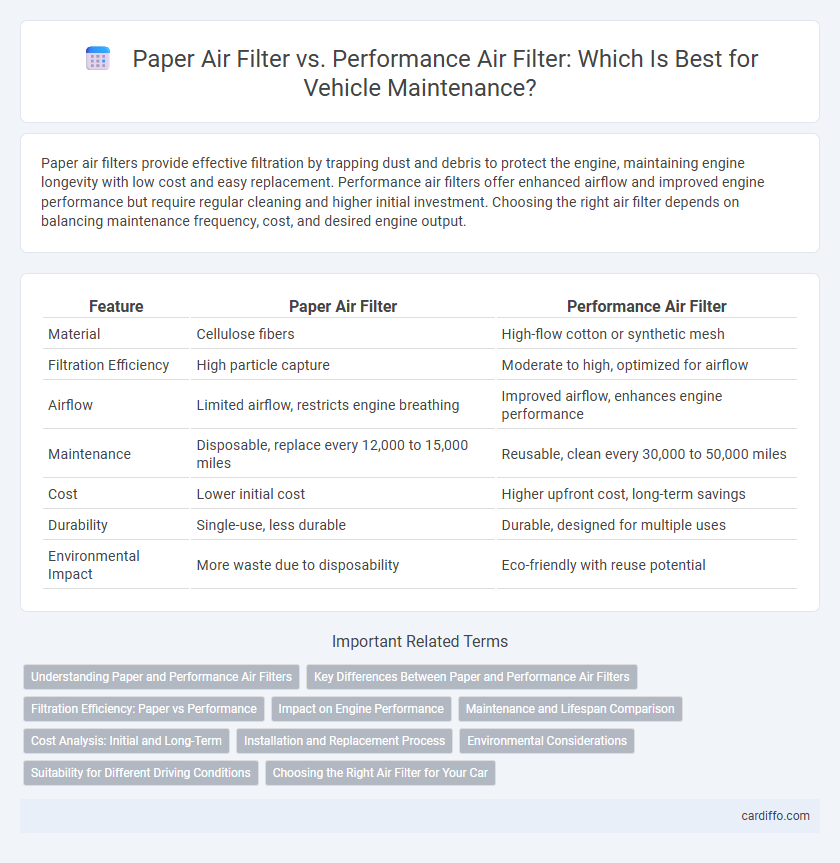Paper air filters provide effective filtration by trapping dust and debris to protect the engine, maintaining engine longevity with low cost and easy replacement. Performance air filters offer enhanced airflow and improved engine performance but require regular cleaning and higher initial investment. Choosing the right air filter depends on balancing maintenance frequency, cost, and desired engine output.
Table of Comparison
| Feature | Paper Air Filter | Performance Air Filter |
|---|---|---|
| Material | Cellulose fibers | High-flow cotton or synthetic mesh |
| Filtration Efficiency | High particle capture | Moderate to high, optimized for airflow |
| Airflow | Limited airflow, restricts engine breathing | Improved airflow, enhances engine performance |
| Maintenance | Disposable, replace every 12,000 to 15,000 miles | Reusable, clean every 30,000 to 50,000 miles |
| Cost | Lower initial cost | Higher upfront cost, long-term savings |
| Durability | Single-use, less durable | Durable, designed for multiple uses |
| Environmental Impact | More waste due to disposability | Eco-friendly with reuse potential |
Understanding Paper and Performance Air Filters
Paper air filters provide efficient filtration by trapping fine particles and contaminants, ensuring clean airflow to the engine for optimal performance and longevity. Performance air filters use advanced materials like cotton or foam, offering increased airflow and improved engine power while still filtering debris effectively. Understanding the differences helps in selecting the right air filter based on driving conditions, maintenance frequency, and desired engine responsiveness.
Key Differences Between Paper and Performance Air Filters
Paper air filters offer basic filtration with lower cost and are designed for standard driving conditions, capturing larger particles effectively but restricting airflow. Performance air filters use high-quality materials like cotton gauze or foam, allowing increased airflow for improved engine performance and horsepower while providing superior filtration for finer particles. Maintenance intervals differ as paper filters require more frequent replacement, whereas performance filters can be cleaned and reused multiple times, enhancing long-term value.
Filtration Efficiency: Paper vs Performance
Paper air filters typically provide adequate filtration efficiency by capturing large particles and debris, making them cost-effective for general maintenance. Performance air filters use advanced materials like oiled cotton or synthetic fibers to trap finer contaminants and improve airflow without compromising filtration. Enhanced filtration efficiency in performance filters leads to better engine protection and longevity, especially in demanding driving conditions.
Impact on Engine Performance
Paper air filters provide adequate filtration but can restrict airflow, reducing engine efficiency and power output. Performance air filters utilize advanced materials that enhance airflow and improve combustion, resulting in increased horsepower and throttle response. Choosing a performance air filter can lead to better fuel economy and prolonged engine life by maintaining optimal air-to-fuel ratios.
Maintenance and Lifespan Comparison
Performance air filters typically require less frequent maintenance than paper air filters due to their washable and reusable design, extending their lifespan significantly. Paper air filters generally need replacement every 12,000 to 15,000 miles, while performance filters can last up to 50,000 miles with proper cleaning. Regular maintenance of performance filters involves rinsing and re-oiling, which enhances airflow and engine efficiency compared to the disposable nature of paper filters.
Cost Analysis: Initial and Long-Term
Performance air filters typically have a higher initial cost compared to paper air filters, but their reusable design reduces the need for frequent replacements, resulting in lower long-term expenses. Paper air filters are cheaper upfront but require regular changing, which can accumulate significant costs over time due to both filter purchases and labor. Evaluating total cost of ownership reveals that performance filters provide better value for drivers focused on durability and extended maintenance intervals.
Installation and Replacement Process
Paper air filters require straightforward installation and replacement, typically involving removing the air filter housing cover and placing the new filter without modification. Performance air filters often demand more careful handling during installation to ensure a precise fit and may need cleaning and re-oiling instead of outright replacement. Maintenance intervals for performance filters vary but generally offer longer service life compared to disposable paper filters, optimizing airflow and engine performance.
Environmental Considerations
Paper air filters are typically disposable, contributing to landfill waste after each replacement, whereas performance air filters are often reusable and designed for long-term use, reducing environmental impact. Performance air filters can be cleaned and re-oiled multiple times, decreasing the need for frequent replacements and minimizing resource consumption. Choosing a reusable air filter supports sustainable maintenance practices by lowering waste output and promoting eco-friendly vehicle care.
Suitability for Different Driving Conditions
Paper air filters are ideal for everyday driving and provide efficient filtration in urban and light traffic conditions, ensuring engine protection with low maintenance costs. Performance air filters suit high-performance vehicles and aggressive driving, offering improved airflow and horsepower under demanding conditions such as racing or off-road environments. Choosing the right filter depends on the driving style, with paper filters excelling in regular use and performance filters enhancing power in sportier scenarios.
Choosing the Right Air Filter for Your Car
Selecting the right air filter for your car involves weighing the benefits of paper air filters and performance air filters; paper filters offer reliable filtration with cost-effective replacement intervals, while performance air filters provide enhanced airflow and improved engine efficiency for high-performance vehicles. Consider your driving habits and engine demands--standard daily commuting may favor paper filters for optimal filtration, whereas racing or heavy-duty use benefits from the increased airflow and reusable nature of performance air filters. Maintenance frequency, filter lifespan, and compatibility with your car's make and model are crucial factors to ensure engine longevity and fuel efficiency.
Paper Air Filter vs Performance Air Filter Infographic

 cardiffo.com
cardiffo.com